A UC Santa Cruz special report: How to find truth in today’s partisan world
## Can public philosophy teach us to think?
“Thinking is not agreeing or disagreeing. That’s voting.” —Robert Frost, poet
Twice a month from last September to February, UC Santa Cruz philosophy lecturer Kyle Robertson woke up early, dropped his kids off at school, drove north for one hour and fifty minutes, crossed the Richmond Bridge, and went to San Quentin.
He would park in the prison lot, walk past a gift shop selling art created by death row inmates, and enter the main gate, where he would sign in at the first of three consecutive checkpoints. Finally entering the prison yard, he would walk past prisoners playing on the basketball courts and others engaged in games of chess, to get to the education center of the prison.
Robertson was there to teach a course in Ethics Bowl—a non-confrontational alternative to the traditional competitive form of debate—in collaboration with the Prison University Project (PUP). At the same time, he was also teaching an undergraduate course and coaching a team in Ethics Bowl at UC Santa Cruz. He soon suggested and arranged a very unusual debate between seven philosophy students from UC Santa Cruz and a team of prison inmates from San Quentin. It took place in the prison chapel—in front of an audience of nearly 100 inmates.
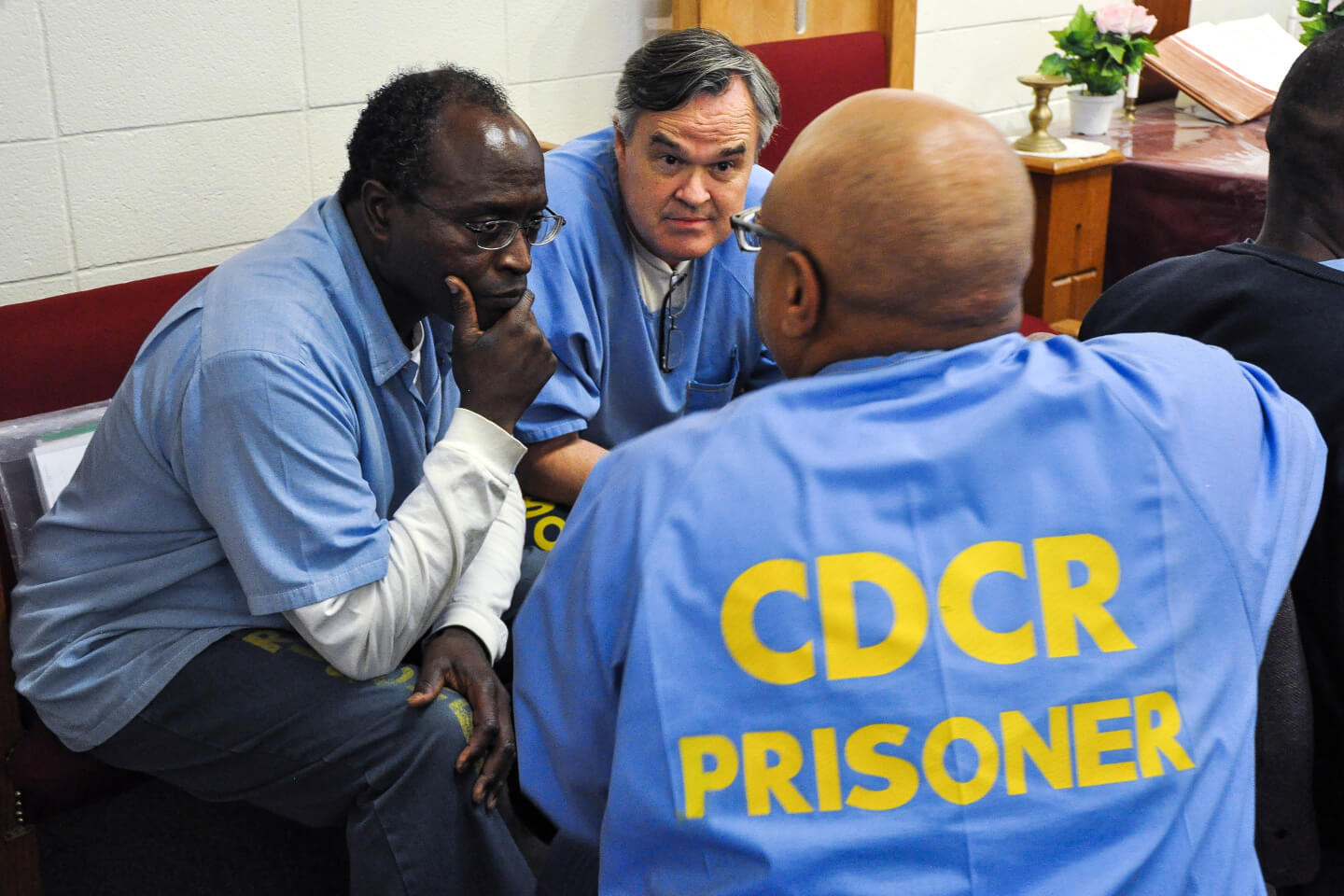
“This is the first time there’s been a debate inside San Quentin,” says Robertson, who served as moderator. “And it’s one of the first Ethics Bowls that’s ever happened in a prison.
“It was a smashing success, but it was no small feat logistically,” he adds. “Because in the prison environment, everything runs on a tight schedule, and control of that schedule is entirely in the guards’ hands, not mine. We had to alter the format a little—for example, we made a 10-minute break in the middle of the round, because all of the inmates had to file outside for a count at that point. All inmates in the state of California are counted around 4 p.m., whether they are relaxing on the yard or competing in an Ethics Bowl.”
The event at San Quentin is just one of the many outreach activities of the Center for Public Philosophy (CPP) at UC Santa Cruz. Founded in 2015 by associate professor of philosophy Jon Ellis, it is supported by The Humanities Institute, an incubator for humanities research on the Santa Cruz campus.
The center is also coaching and conducting regional Ethics Bowls for high schools throughout Northern California; creating short animated videos about philosophical problems that teach reasoning skills and how to avoid biased thinking; teaching moral philosophy and ethics in Santa Cruz jails; working with biologists to study how language affects conservation efforts; and even introducing philosophy, ethics, and critical thinking to children at three elementary schools in the local community.
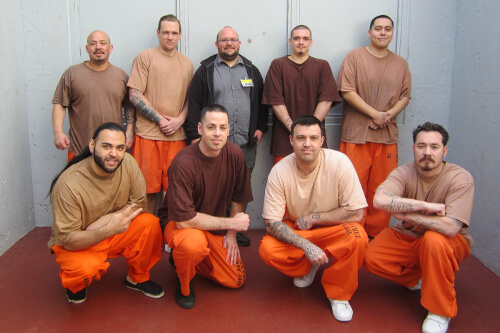
The idea is to move philosophy away from the stereotype of the old bearded man pondering in the mountains and instead apply its principles to crucial problems we all face in today’s world. And in an era of intense partisanship, rabid fighting on social media, “fake news,” and “alternative facts,” the center promotes a new normal of how to talk about the really big issues confronting us today—in a civilized, rational, and much friendlier manner.
“The goal of the Center for Public Philosophy is to improve the caliber of deliberation and dialogue in the general public,” says Ellis, director of the center. “Our programs seek to promote healthy habits of thinking and reasoning by drawing on key insights from the history of philosophy and the findings of cognitive science.”
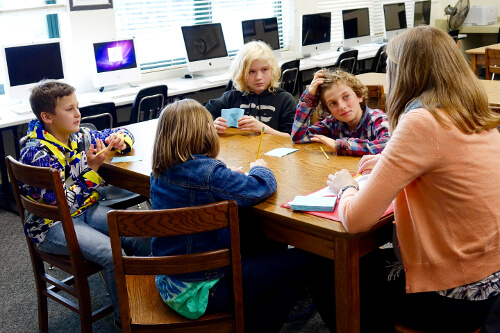
Ethics Bowl is the opposite of traditional forms of debate in this country—the “win-at-all-costs,” negative, whatever-it-takes debate that is typical of cable news, congressional debates, election campaigns, and our courtrooms. Both Ellis and Robertson believe that traditional debate competitions, a well-established part of the U.S. high school curriculum since early in the 20th century, ultimately strengthen and reward one-sided thinking.
“I think that the way we argue in courts of law, and in ‘forensic’ debate competitions, has undermined our ability to engage in the constructive debate that is necessary for democracy to function. Ethics Bowl, or something like it, could be a cure,” says Robertson, who earned a law degree from UC Berkeley and practiced for two years in Silicon Valley, before earning a Ph.D. in philosophy from UC Santa Cruz.
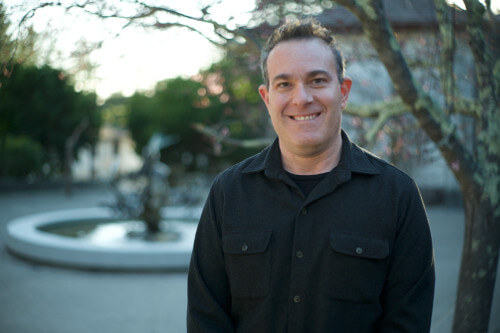
“Standard debate is reasoning with an agenda,” adds Ellis. “It is also what we find so corrosive in today’s politics. People have their favored view and then emphasize the information that fortifies their stance. Evidence that threatens their position is rationalized away, while problems for the opposing view are scavenged for, and then magnified.
“Not surprisingly, schools and communities around the country are pursuing alternative forms of debate, ones that switch the order of priority, and set the goal of truth and understanding over the goal of persuasion.”
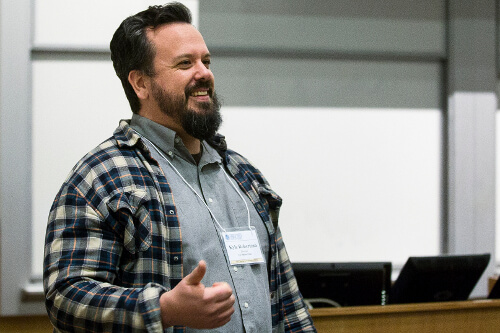
Robertson notes that 13 prisoners were originally in his class training for the Ethics Bowl debate at San Quentin, but over the course of the semester, “two guys got out, so we lost them from the team.” The two-hour class covered topics such as moral theory and how to use ethics to justify a position in a case.
“They loved it—they were really into it,” says Robertson. “They would stay after class to talk to me; they would not want to stop talking,” he adds. “They read incessantly and were really well-prepared. I think also, pragmatically, they were learning moral advocacy skills for their own hearings—many have life sentences with a possibility of parole.”
But for the UC Santa Cruz students, training for the debate was a mixture of anxiety and adrenaline.
“Their first reaction was excitement; the fear came as they actually thought more about it, particularly on the day of the event,” says Robertson. As senior philosophy major Anna Feygin (Oakes,’18) notes, “It’s one thing to be forewarned about what to expect when you head inside a prison; it’s another to actually experience it.”
“I was nervous because I was essentially going and walking into a prison, but excited at the same time,” she recalls. “I’d never been to a prison—let alone talked to a prisoner, or an ex-prisoner, or a current prisoner—so it was pretty nerve-wracking at some points.”
Third year philosophy student Pedro Enriquez (Oakes, ‘19) also had some concerns.
“I thought it was going to be a lot more like the movies where they’re locked down, and you know, they’re going to be hollering or whatever. So when we walked in after we passed the security and they were just walking around, I was like, ‘Wait, is anybody gonna do anything, like where are all the cops, what if they do something?’
“I think I was nervous because it was such a new environment for me, and we were going to be in front of so many inmates,” he adds. “We came in thinking we were on the book-smart side, and they were very much on the street-smart side, so there was a different dynamic going in. That made me nervous, and I don’t know, it just seemed like a very important event.”
But their fears were soon alleviated.
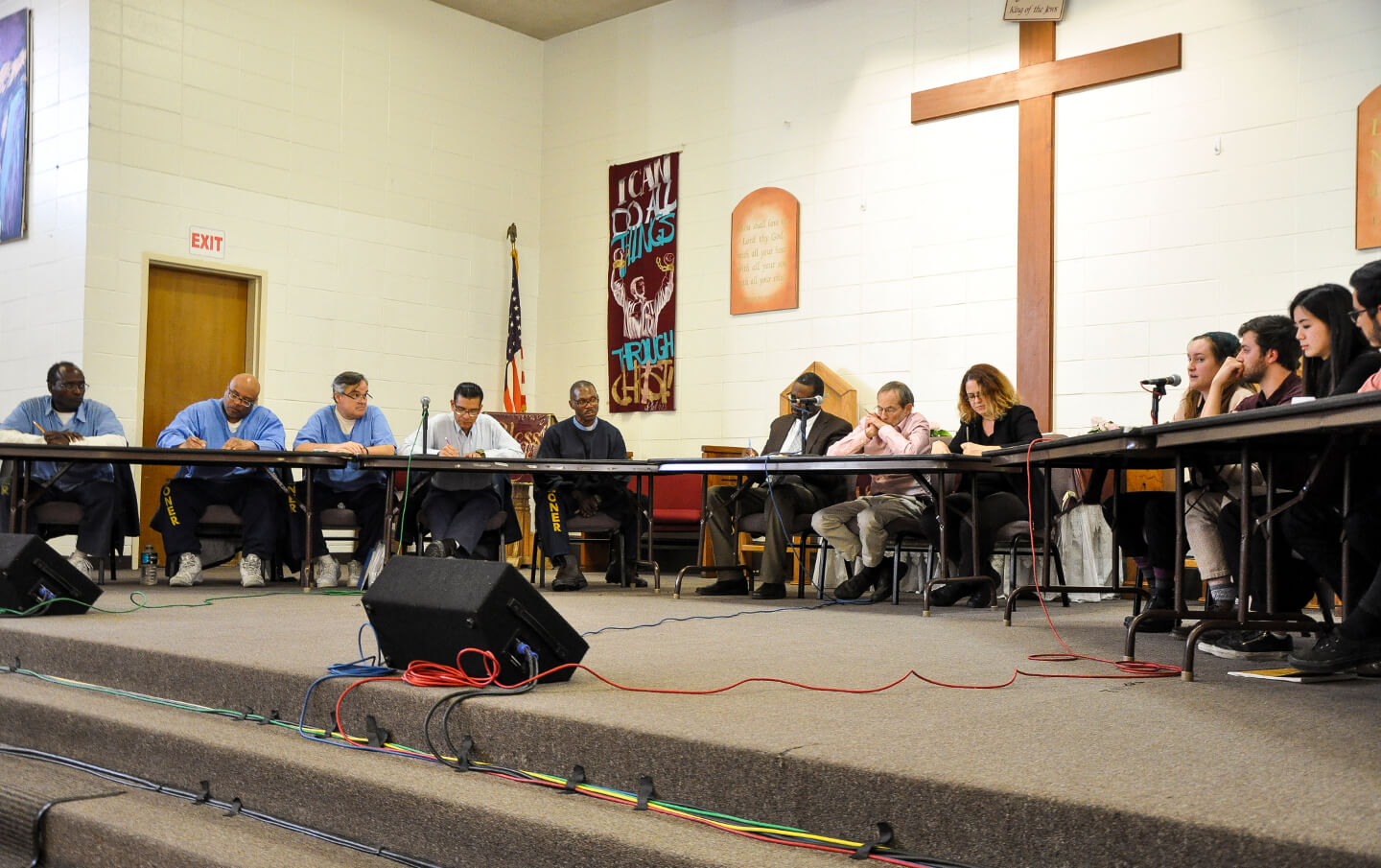
“Once the prisoners started coming up and talking to us, they were really friendly,” says Enriquez. “And I remember looking out into the crowd and seeing the inmates and how attentive they were, and seeing all the volunteers and just thinking, ‘Wow, this is a big deal.’ You know, it’s easy for me to think of this as an extracurricular activity, but it means a lot more than that to a lot of people.”
“I just remember going around and shaking everyone’s hands and thanking them for letting us do this, because it really was a once-in-a-lifetime opportunity,” Feygin adds. “Overall, it was a remarkable and eye-opening experience, and I am very grateful to have been a part of it.”
The goal of the Center for Public Philosophy is to improve the caliber of deliberation and dialogue in the general public. Our programs seek to promote healthy habits of thinking and reasoning by drawing on key insights from the history of philosophy and the findings of cognitive science. —Jon Ellis, UC Santa Cruz associate philosophy professor
“How many of you have been to San Quentin before?” says the warden, addressing the guests and UC Santa Cruz students just before the Ethics Bowl debate begins. “Is this what you thought prison was going to be like? For most people who come in who have never been to San Quentin, this isn’t what they expect … and we’re pretty proud of that.
“This doesn’t happen everywhere,” he adds. “We’re blessed to have people willing to come in and give their time for rehabilitation.”
One of those people giving their time is Amy Jamgochian, the academic program director for the Prison University Project (PUP), a nonprofit organization that supports the college program at San Quentin. One of the few on-site prison college programs in the country, its mission is to provide and support increased access to higher education for incarcerated people, as well as to encourage public awareness of higher education access and criminal justice.
“I hadn’t heard of the Ethics Bowl format before Kyle introduced it to us, and I love it,” says Jamgochian. “It offers components of argumentation that are missing in traditional debate and that create a more nuanced and analytical dialogue. I’m delighted that our students have the chance to be exposed to this particular format.
“We aim to offer a college experience inside prison that is as close to college outside prison as possible. This means that our courses are rigorous and we have high expectations of our students, but we’re also trying to build a campus community, which the event played a lovely role in.”
“Our students are humans embedded in communities, whether they leave prison in a week, in a year, or never,” Jamgochian adds. “They have cellmates, friends, wives, mothers, children, grandchildren, and friends. They write op-eds, short stories, novels, and letters to senators. They teach courses to other prisoners, and they advocate for themselves and for their friends and families. It may well be the goal of the prison system to strip prisoners of citizenship, but humanity can’t be squelched, and there are modes of citizenship that don’t require voting or physical freedom. The principles of Ethics Bowl are the principles of healthy democracy: understanding the issues, advocating for one’s beliefs, listening to others’ ideas, and engaging in respectful dialogue.”
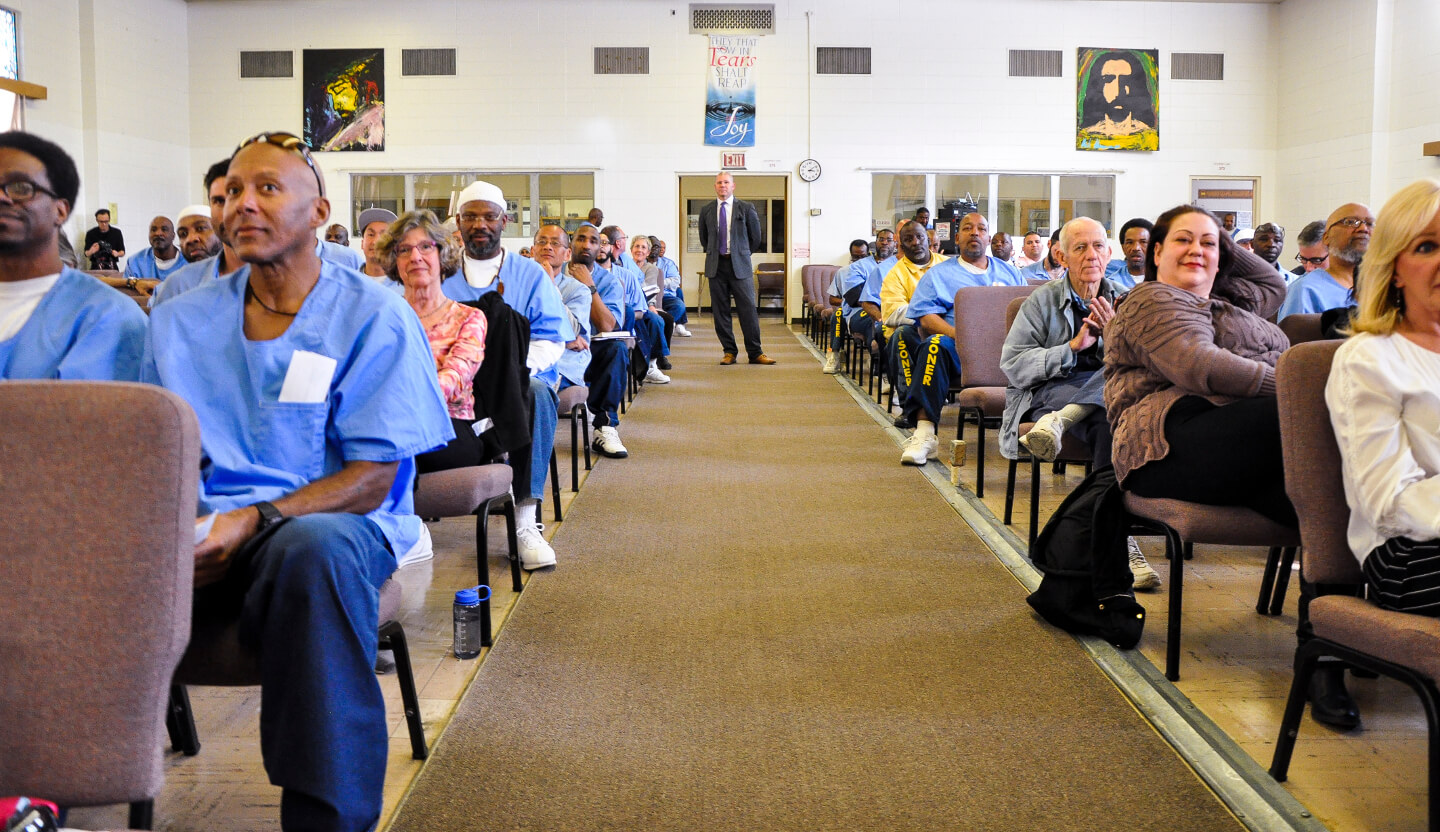
The Ethics Bowl class and subsequent debate with UC Santa Cruz philosophy undergraduates affected the inmate participants in a variety of ways. Each had a personal reason for taking part in the debate, and afterward, most expressed a desire to participate in future Ethics Bowl debates.
“I decided that it would a great idea and learning experience to engage other students in some type of formal debate,” says inmate Randy Akins. “Just to be able to interact with the public made me feel whole again.
“I’ll do it again,” he adds. “I learned how to incorporate other people’s views into a cogent argument.”
Inmate Forest Jones had a different take on the experience.
“I wanted to represent my team and demonstrate the knowledge I’ve been learning in the Prison University Project classes,” says Jones. “I’d never participated in a debate and wanted to experience its setting.
“Coming into this Ethics Bowl class and debate, I struggled in the understanding of the concepts of ethics,” Jones adds. “But doing the exercise of applying them to real-life events has helped me better understand them. They are not some abstract concepts, but relevant and applicable in solving life’s problems.
“I enjoyed the conversation and exchange of knowledge with the students,” says Jones. “I would participate in another debate if you had one. But I may have to do it in a public university, because I appear before the parole board in a month and a half.”
One of the three judges for the San Quentin Ethics Bowl was Sandra Dreisbach, who cofounded the first Ethics Bowl team at UC Santa Cruz while still a graduate student. Now a lecturer in the Philosophy Department, Dreisbach observed that both the San Quentin team and the UC Santa Cruz undergraduate student team did more than have an ethics debate—they demonstrated what it means to be ethical.
“For me it represented the true spirit of what ethics and Ethics Bowl is about: being truly compassionate and respectful toward others by being fully open to all perspectives on moral issues that concern us all, regardless of what differences we possess,” says Dreisbach. “The San Quentin prisoners and the UC Santa Cruz undergraduate students may be deeply different in their experiences, their age, and education, but they all came together to share their moral views with true sincerity and full engagement with each other. In the end, what both teams exemplified in this San Quentin Ethics Bowl is what we all share—our human experience.
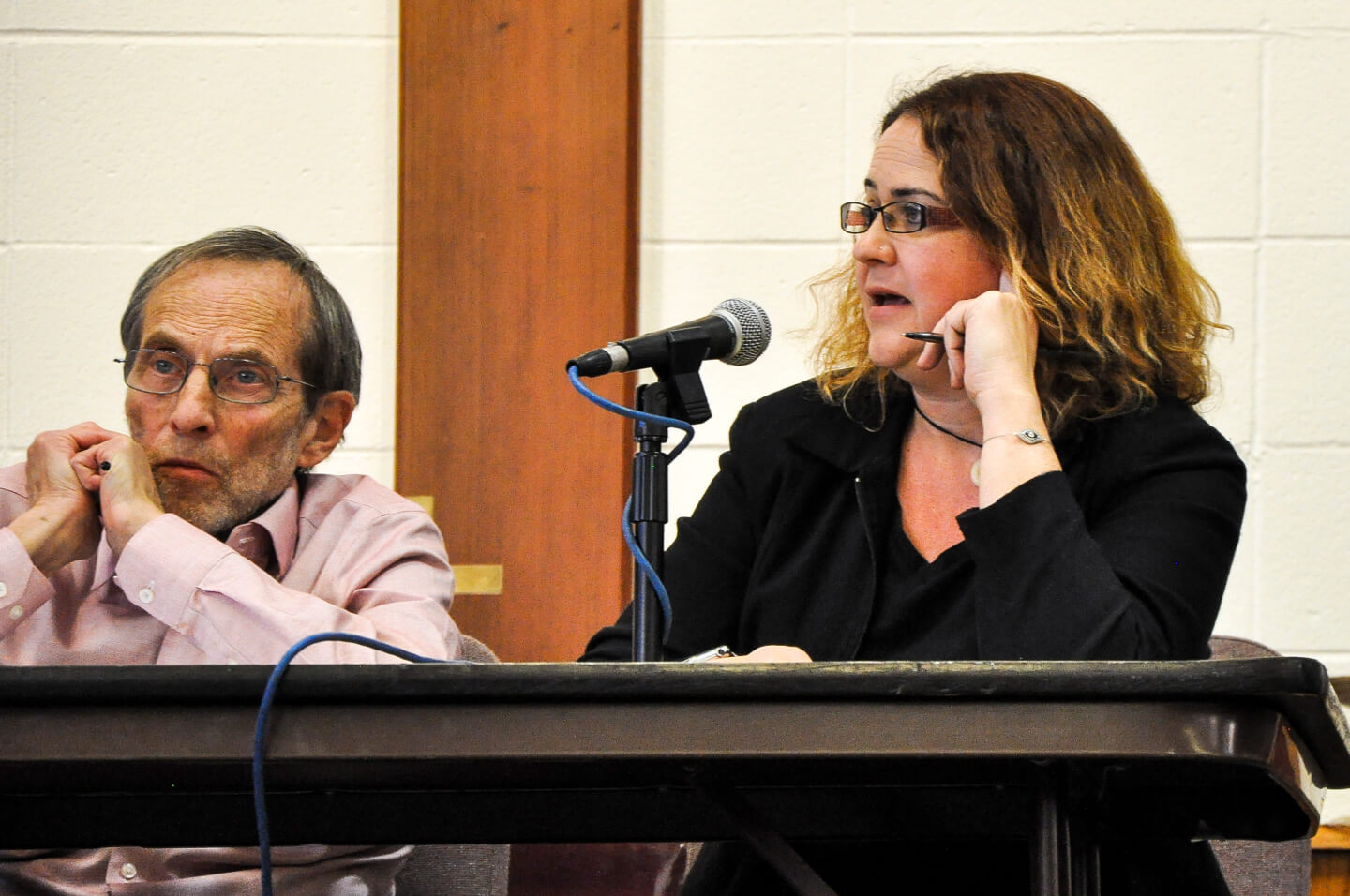
“It is one thing to understand in principle that there are people in prison for life and that inmates, as human beings, deserve to be treated with respect regardless of what crimes they have been convicted of,” Dreisbach adds. “It is quite another thing to leave the comfort and familiarity of UC Santa Cruz and trappings of everyday life, and willingly enter San Quentin prison, meet inmates, and actively discuss and debate with them. This is an invaluable life experience that instructs deeper than any classroom lesson could have provided.”
There’s no shortage of contentious topics that can be debated in an Ethics Bowl—ranging from the Trump Administration’s “Muslim Ban,” to the use of military drones, to political discussion on social media, to the ethics of marital infidelity. Not to mention ethical questions about birth control and the Affordable Care Act, video games involving virtual and augmented reality, working while sick, online privacy, banning religious garb, and “donor babies.”
At San Quentin, the students and prisoners grappled with just two cases: “Should we change a rule made by the American Psychiatric Association that states it is unethical for psychiatrists to give a professional opinion about public figures they have not examined in person?” (a rule that has recently generated public debate because of President Donald Trump), and “Is it ethical to boycott, divest, and sanction Israel for its actions in the West Bank and Gaza Strip?”
But perhaps the most stirring thing for UC Santa Cruz philosophy professor Jon Ellis was how genuinely excited the inmates in the audience were by the excellent job the San Quentin team was doing at this particular exercise of fair-minded reasoning and open-minded listening.
I think that the way we argue in courts of law, and in ‘forensic’ debate competitions, has undermined our ability to engage in the constructive debate that is necessary for democracy to function. Ethics Bowl, or something like it, could be a cure. —Kyle Robertson, UC Santa Cruz philosophy lecturer
“There was an integrity there that really stood out to me, in the way that both teams—but especially the San Quentin team—engaged with the questions that were posed, showing a sincere respect for the complexities of the thinking and reasoning required by the difficulty of the issues,” says Ellis.
“It was very interesting. After the first round ended and the applause died down, an inmate in the audience stood up and said loudly, ‘You know that marginalization you all were talking about? Our being in here is the result of that.’ It was a tense and poignant moment that really stayed with me.
“I was no less impressed by the UC Santa Cruz team,” he adds. “It took a great amount of courage to do what they did. What was most impressive to me though was the poise and goodwill the students showed after losing the debate to the inmate team. If there was bitterness or disappointment, it didn’t come through at all; rather, directly after the event, they were genuinely and eagerly debriefing with the inmates, exchanging ideas, perspectives, and appreciation.”
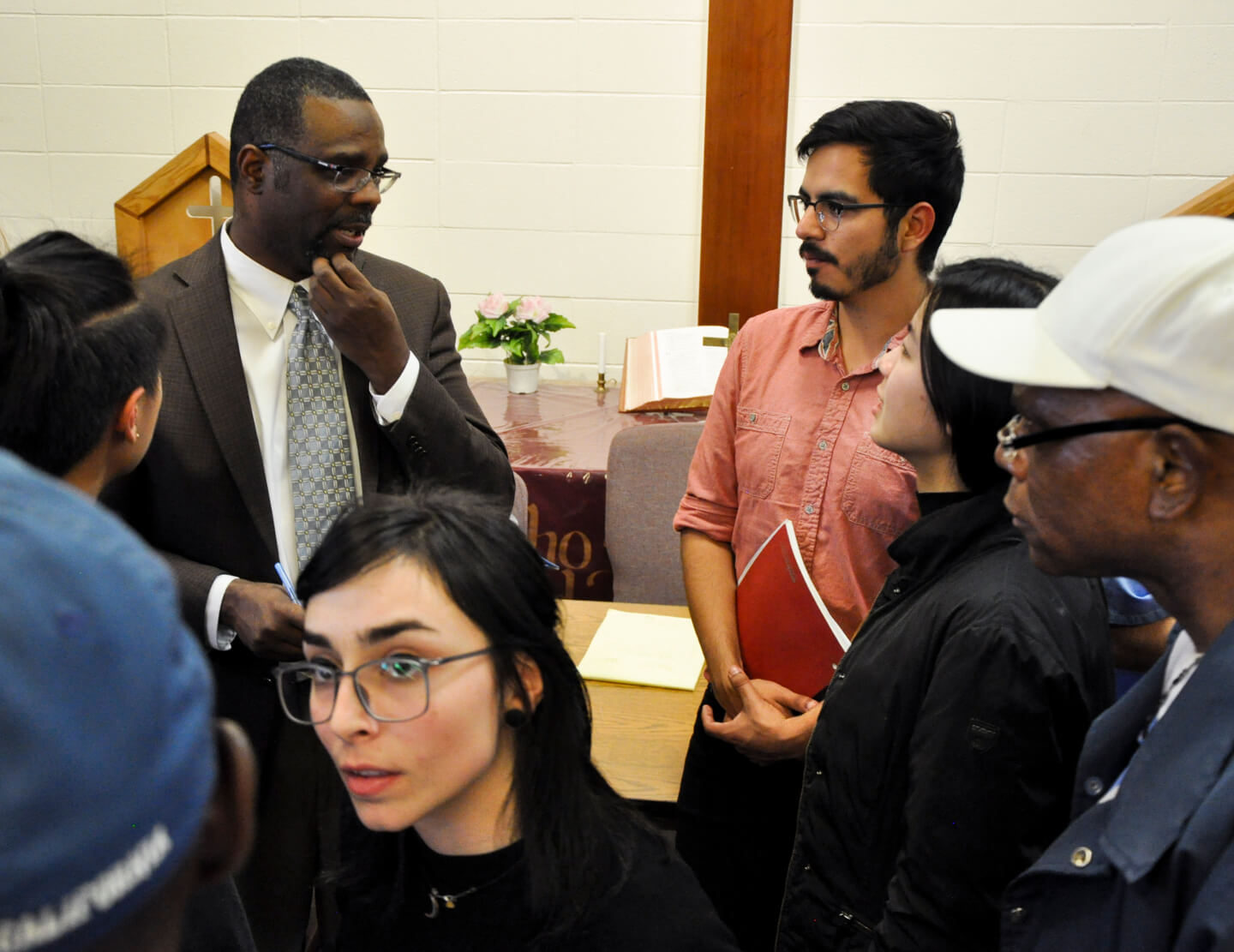
Robertson says that he plans to co-teach a class next year with the Prison University Project at San Quentin, and that together they hope to hold future Ethics Bowls at San Quentin involving up to four new prison teams. He adds that the Center for Public Philosophy is also hoping to expand its outreach locally and host the first ever Ethics Bowl in the Santa Cruz County jail system.
“This type of event embodies the type of activity I value at the center for a variety of reasons,” says Robertson. “It reaches out to communities that are generally not included in our public deliberations about difficult ethical and political situations. I think that a good public philosophy program should spend a lot of time soliciting and amplifying voices that are not usually heard in philosophy, or political science, or public political discourse in general. The San Quentin inmates are often the objects of such deliberation, but rarely, if ever, participants.
“It also teaches students much more about what they believe, and why they believe it, than a traditional ethics classroom experience,” he adds. “The pressure of public performance induces students to work so much harder in preparation than they ever do to write a paper for an academic class. Plus, the public nature of Ethics Bowl makes the students get outside of the ‘what does the professor want to hear’ mindset. They don’t know who the judges will be beforehand, and they know they’re speaking to an audience of community members and peers. This pushes them, I think, to make arguments that they themselves believe in rather than trying to predict what others want to hear.”
As senior UC Santa Cruz philosophy student Pablo Fitten observed after the debate: “This was easily as an undergraduate the most applied philosophical endeavor that I’ve ever done. I think it was one of the most interesting and beneficial undergraduate experiences that I’ve had as a philosophy major.”
